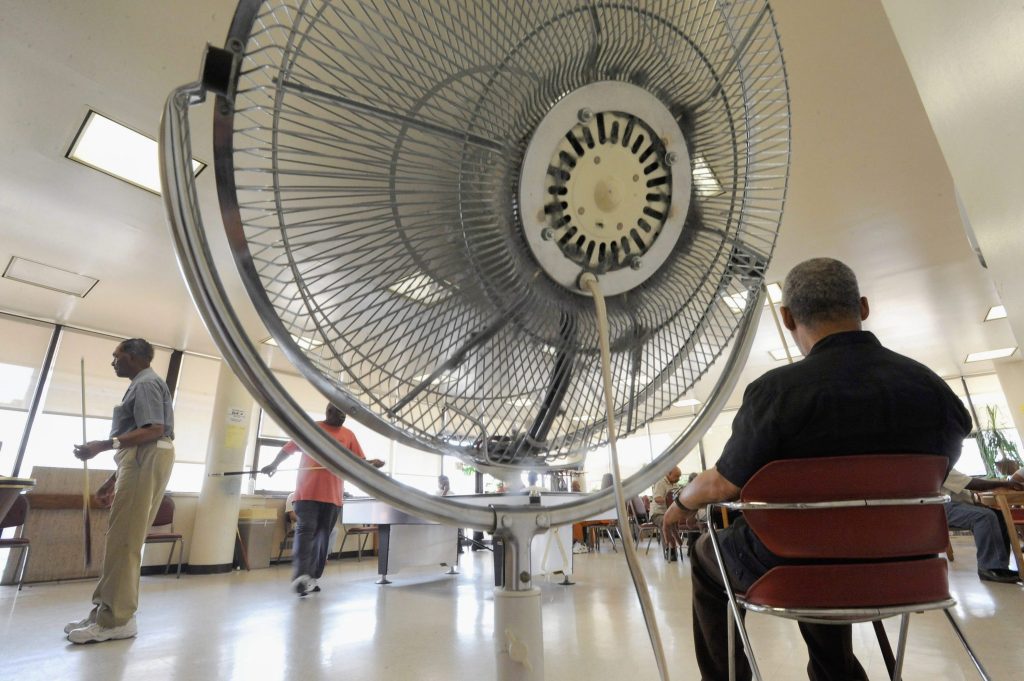Fans are a critical tool to keep Quebec’s seniors cool during periods of extreme heat, concludes a study recently published by a Montreal researcher.
This is the second phase of a study whose initial results showed last November that using a fan reduced cardiac workload during exposure to heat of 38 degrees Celsius with 60 per cent humidity.
Related:
“The overall objective of the project is to identify simple strategies to reduce the physiological responses of the human body during heat exposure,” summarized study author Daniel Gagnon, who is a professor at the School of Kinesiology and Physical Activity Sciences at the University of Montreal and a regular researcher at the Montreal Heart Institute.
In the United States, the influential Center for Disease Control and Prevention advises against the use of fans at temperatures above 32 degrees Celsius due to fears of overheating.
Professor Gagnon and his colleagues, notably at the University of Sydney in Australia, however, came to different conclusions after studying around 60 subjects with an average age of 70, half of whom had heart disease. This allowed them to observe that in cases of humid heat reaching up to 38 degrees, the use of a fan is beneficial, as it helps reduce both body temperature and the workload of the heart in older people.
Fan use is not recommended for the elderly in dry heat above 42 degrees, as it significantly increases body temperature and cardiac output. In these conditions, it would be preferable to opt for spraying water on the skin, a method that helps reduce cardiac stress.
From a Quebec and probably Canadian perspective where temperatures rarely exceed 38 degrees, the authors of the study therefore believe that the use of a fan is almost always recommended.
“In very intense and dry heat conditions, fan use worsened all outcomes and should be discouraged under these conditions,” they write in the medical journal JAMA Network Open. “Skin humidification reduced sweating and improved perceptions in both heat conditions and may be recommended to minimize the risk of dehydration.”
In 38-degree heat with 60 per cent humidity, Gagnon said, using the fan slightly reduced the increase in internal temperature, although it did increase sweat production “a tiny bit.”
Spraying water on the skin while using the fan at this time had no impact on internal body temperature, but did reduce sweat production.
However, in very hot and dry conditions of 45 degrees and 15 per cent humidity, “the fan was really bad, therefore dangerous, because it increased the internal temperature more, it increased sweat production more and people felt less well,” Gagnon stressed.
“The simple takeaway message is essentially that up to 38 degrees, the fan is going to be effective in reducing our physiological responses when it’s hot,” he said. “And probably at 42 degrees and above, that’s where the fan makes things worse.”
In Quebec, and more generally in North America, hot temperatures usually hover around 30 degrees Celsius, Professor Gagnon recalled, and are accompanied by humidity that ranges from moderate to high.
Mercury of 40 or even 50 degrees Celsius and low humidity are more the reality elsewhere in the world, he added.
“So, in Quebec, for the heatwave conditions we experience here, the fan will almost always be effective,” said Gagnon.
And even if the outside thermometer crosses the 40-degree mark, he continues, this does not mean that the fan is no longer effective, since the important thing is the temperature inside the home. It only needs to be a few degrees cooler inside for you to use the fan to cool down.
This is essentially in line with recent recommendations from the World Health Organization, Gagnon said, “which suggest that the fan can be effective up to 38 degrees, or even 40 degrees.”
“We are providing a little more clarity that (the fan) can be effective above 32 degrees Celsius,” he said.
As we age, he recalled, it has been shown in the laboratory that the body loses some of its ability to cool itself by producing sweat, “so the body experiences a little more physiological stress, if I can put it that way.”
The body of a young athlete in very good shape is “resilient,” the researcher continued. “The body will sweat, the heart rate will increase, and then it may be uncomfortable, but it has no consequences for health.”
But at the other extreme, in the case of an elderly person whose health is a little more fragile, “perhaps the physiological response will not be very strong,” said Gagnon.
“This may be the final straw,” he warned. “If the heart is already weakened, perhaps having to work harder (in response to the heat) could lead to a heart attack. If the kidneys are weakened or there is kidney disease, sweating and potentially being dehydrated (could lead) to acute kidney injury.”
Beyond the health benefits, Gagnon said, the new study could help seniors who have access to air conditioning save money by turning up the temperature a little and using a fan to finish cooling off.
–This report by La Presse Canadienne was translated by CityNews




